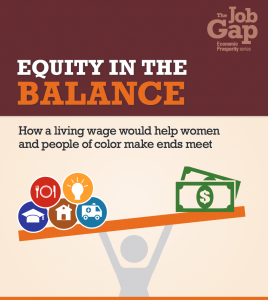FOR IMMEDIATE RELEASE
Nov. 18, 2014
Contact: Kathy Mulady, communications director
kathy@allianceforajustsociety.org
Only 52 percent of Full-Time Workers of Color Earn Enough to Make Ends Meet
Just 57 percent of women and 42 percent of Latino workers earn enough working full time to cover their basic needs
SEATTLE — During this season of abundance, many full-time workers across America don’t earn enough for a single person to survive, much less to support a family. The staggeringly low percentage of women and people of color who earn a living wage is especially troubling.
“Equity in the Balance,” a report by the Alliance for a Just Society released today, details just how few women, people of color, and non-citizens in the U.S., working full-time, make a living wage — that is, earn enough income to cover basic expenses.
Only 61 percent of all full-time workers earn a wage that allows a single adult to make ends meet. Only 57 percent of women, and just 52 percent of people of color make a living wage. Just 42 percent of Latino workers earn enough to make ends meet. Among non-citizen workers, only 38 percent earn more than $15 per hour.
“A system that unjustly and persistently leaves people of color over-represented in low-wage work is economic racism,” said LeeAnn Hall, executive director of the Alliance for a Just Society. “Policies that keep women over-represented among low-wage workers is gender discrimination.
“It’s time to increase the national minimum from a $7.25 poverty wage to $15 an hour to ensure that full-time work pays enough to do more than barely survive, and so our families and economy can thrive.”
“Equity in the Balance” is a groundbreaking report, said Dorian Warren, associate professor of political science at Columbia University.
“No one in the country is talking about economic racism – and here, in this report, are the numbers that clearly illustrate its existence and its impact,” Warren said. “When people talk about poverty, race has disappeared from the conversation. The economy and race have become uncoupled in our country.”
Policies and practices in the U.S. have perpetuated low wages in jobs and industries where women and people of color primarily work.
“ ‘Equity in the Balance’ provides a stark national picture of what we’ve been seeing over the past decade in the restaurant industry, one of the largest private-sector employers in the nation. Women and people of color bear the brunt of the country’s growing income inequality gap,” said Saru Jayaraman, director of Restaurant Opportunities Centers United.
“Increasingly, the only jobs available to all people are low-wage jobs,” Jayaraman said. “The difference for women and people of color is that they are never able to move out of these jobs and into positions that will allow them to support their families.”
Women of color struggle even more, and are forced to make difficult choices to provide for their children.
“For the first time in history in the U.S., women make up half of the paid labor force. Many of them are moms who are either the sole breadwinner or the primary breadwinner for their families,” said Kristin Rowe-Finkbeiner, executive director of MomsRising.
“Women’s incomes are essential to family economic security – and that economic security is critical to our nation’s overall economic health. That’s our modern reality,” said Rowe-Finkbeiner.
“Equity in the Balance” is the second report in the 2014 Job Gap Economic Prosperity Series. Alliance for a Just Society has produced Job Gap studies on jobs and wages since 1999.
Data from the Alliance’s Job Gap Study figure prominently in debates on minimum wage, paid sick days, payday lending, Medicaid and other family economic issues.
Here is a summary of the recommendations in the report:
-
Invest in state and federal safety net programs, such as childcare assistance. Until there are enough living wage jobs to go around for all household types, families will continue to face tough choices.
Alliance for a Just Society is a national policy, research and organizing network with 14 state affiliates, that focuses on health, racial and economic justice.
# # #
